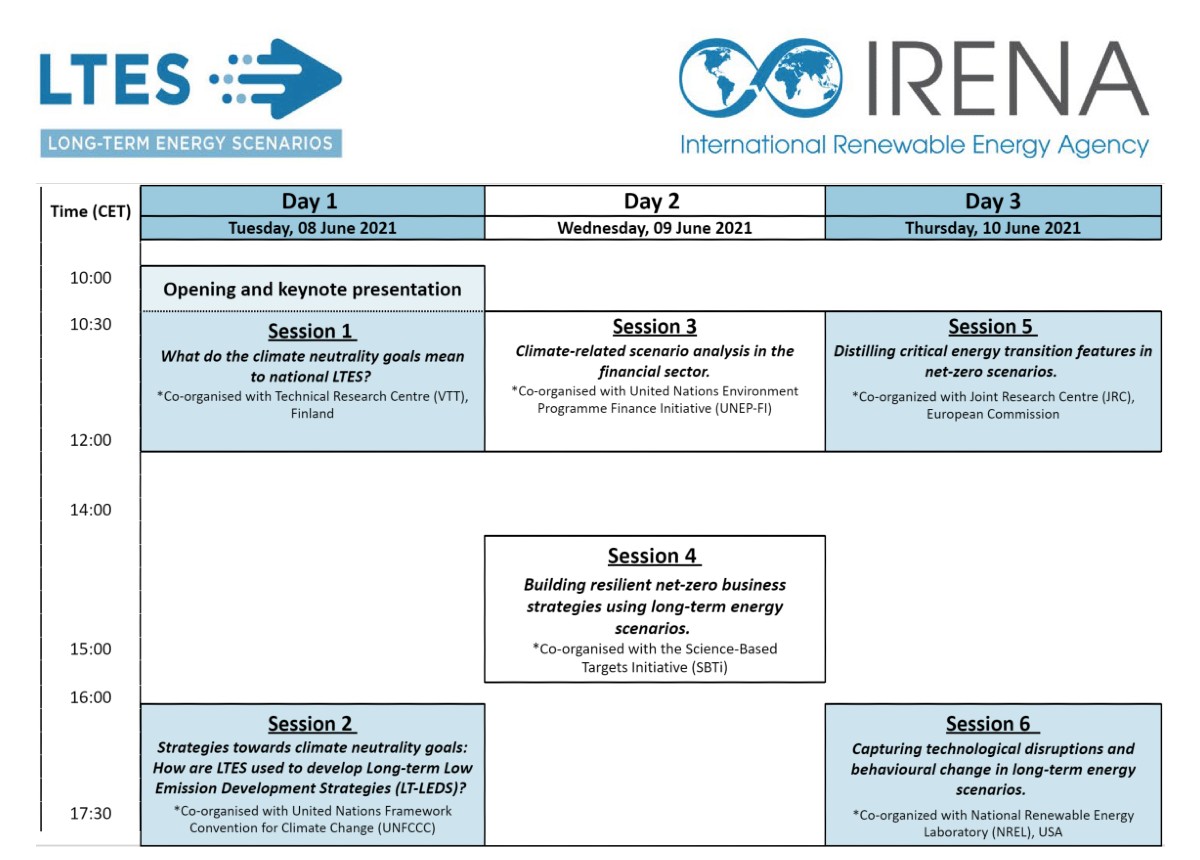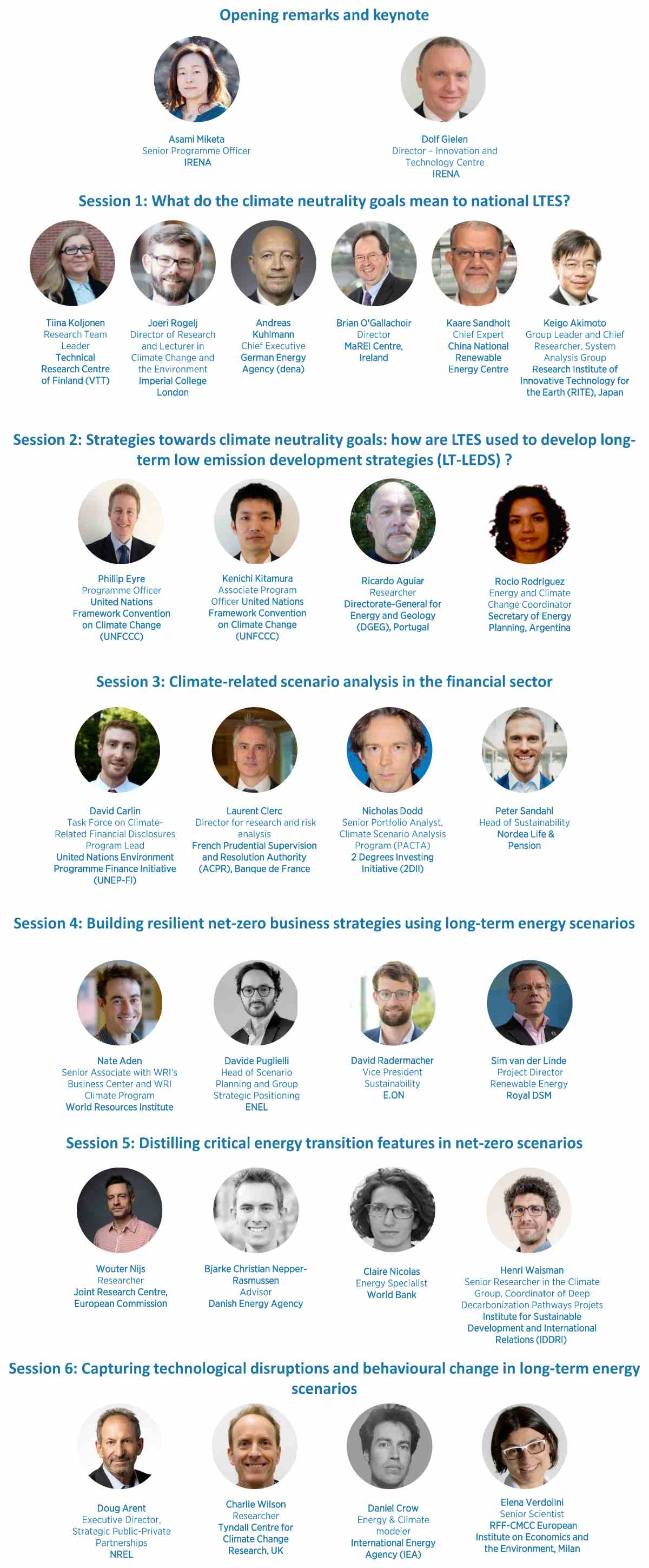
3rd International Forum on Long-term Scenarios for the Clean Energy Transition

This year's overarching topic:
"The role of long-term energy scenarios (LTES) in achieving net-zero commitments."
How can governments and businesses use long-term energy scenarios to spur the discussion and articulate the pathways to achieve carbon neutrality?
Net-zero targets are increasingly mainstreamed in the political agenda around the world. Recent years saw political commitments towards carbon neutrality from various national and regional governments. In the energy sector, fossil fuel use needs to be substantially reduced. Massive electrification of end-uses and synthetic fuels produced with renewable energy is expected to be the energy transition's backbone. Other direct forms of renewable energy and energy efficiency are also likely to play a vital role.
The International Forum on Long-term Scenarios for the Clean Energy Transition brought together scenario practitioners in government, academia, technical institutions and the private sector to discuss how to strengthen the development and improve energy scenarios to guide the clean energy transition. It is the annual flagship event of IRENA's LTES Network and Clean Energy Ministerial LTES Initiative.
This virtual event built on the rich discussions being held through the CEM LTES Initiative and IRENA’s LTES Network. Information on previous iterations of the forum and other events can be found below:
- 1st LTES International Forum | Berlin, April 2019
- 2nd LTES International Forum | Virtual, March 2020
The forum proceedings is available here.
For more information, contact LTES@irena.org
|
Programme |

|
Session outline(Speakers displayed in alphabetical order) |
|
Day 1 | 8 June 2021 |
|
|
10:00 – 10:30 CET |
Opening
Keynote: Net-zero scenario insights from IRENA’s latest World Energy Transition Outlook |
|
10:30 – 12:00 CET |
Session 1: What do the climate neutrality goals mean to national LTES?*Co-organised with Technical Research Centre of Finland (VTT)When developing national LTES for net-zero strategies, government energy planners face the challenge of assessing net-zero implications for the energy sector. They also need to align their national LTES with global net-zero LTES and targets. This concern extends, among others, to the treatment of negative emissions and a full accounting of the clean energy value chain. This session brought together government planners to discuss how net-zero's definition impacts the development of national LTES. Moderator:
Scene-setting presentation:
Panelists:
|
|
16:00 – 17:30 CET |
Session 2: Strategies towards climate neutrality goals: How are LTES used to develop Long-term Low Emission Development Strategies (LT-LEDS)?*Co-organised with the United Nations Framework Convention for Climate Change (UNFCCC)According to the Paris Agreement, the Parties should strive to formulate and communicate long-term low greenhouse gas emission development strategies (LT-LEDS). Many countries have committed to achieving net-zero emissions goal by 2050 in line with pathyways toward the 1.5 °C degree goal. However, most countries have not yet submitted LT-LEDS. Net-zero emissions strategies require a profound transformation of the energy system such as electrifying end-use sectors with green electricity. This session gathered government energy (and climate policy) planners to discuss coordination challenges in energy planning and climate targets and how LTES can bring insights to create ambitious net-zero LT-LEDS. Moderator:
Scene-setting presentation: Panelists: |
Day 2 | 9 June 2021 |
|
|
10:30 – 12:00 CET |
Session 3: Climate-related scenario analysis in the financial sector*Co-organised with United Nations Environment Programme Finance Initiative (UNEP-FI)To date, financial institutions that have wanted to do climate scenario analysis have faced several obstacles. There is an abundance of climate models to choose from, and it is not immediately clear which ones are most relevant. Moreover, the field of climate modelling is technical and difficult to penetrate for non-experts. This session gathered experts from the financial sector to discuss how scenarios can provide a foundation for decision-useful financial and economic analysis. How are scenarios being used to assess climate risks to the economy and financial system, investment flow change and gaps, stranded assets, compliance with the TCFD and UN PRI, etc.? Moderator and scene-setting presentation:
Panelists:
|
|
14:00 – 15:00 CET |
Session 4: Building resilient net-zero business strategies using long-term energy scenarios*Co-organised with Science-Based Targets Initiative (SBTi)The energy transition and the pursuit of net-zero will have a profound impact on the economic system. While many companies are declaring their net-zero objectives, they are also preparing roadmaps to adapt their business strategies to mitigate transitional risks and seize the opportunities that such a transformation brings. This session gathered representatives from the private sector to discuss how companies use LTES to inform business strategies and which type of scenarios is the most relevant for businesses. Moderator:
Panelists: |
Day 3 | 10 June 2021 |
|
|
10:30 – 12:00 CET |
Session 5: Distilling critical energy transition features in net-zero scenarios*Co-organised with the Joint Research Center (JRC)Scenario comparison studies suggest a wide range of technologies for achieving net-zero in the energy sector: electrification and digitalisation of end-use sectors, high shares of variable renewable energy in power generation, hydrogen and other synthetic fuels, among others. This session brought together global and regional scenario experts to discuss the recurring features in LTES aimed at net zero emissions by 2050 and discuss how these translate into non-regret strategies for governments. Can the government already bet on winning technologies? Moderator and scene-setting presentation: Panelists: |
|
16:00 – 17:30 CET |
Session 6: Capturing technological disruptions and behavioural change in long-term energy scenarios*Co-organised with the U.S. National Renewable Energy Laboratory (NREL)Breakthrough technologies and social tipping points are all expected to be part of the net-zero energy transition. Capturing technological disruptions in scenarios will determine if new technologies appear in scenario results. Similarly, consumers' increasing role and lifestyle changes will allow exploring the interaction between energy supply and demand. This session gathered scenario experts to discuss how technological disruptions, such as hydrogen, innovation and electric vehicles can be better captured in LTES. Moreover, how can behavioural change in the context of the transition be explored with scenarios? Moderator and scene-setting presentation:
Panelists: |
